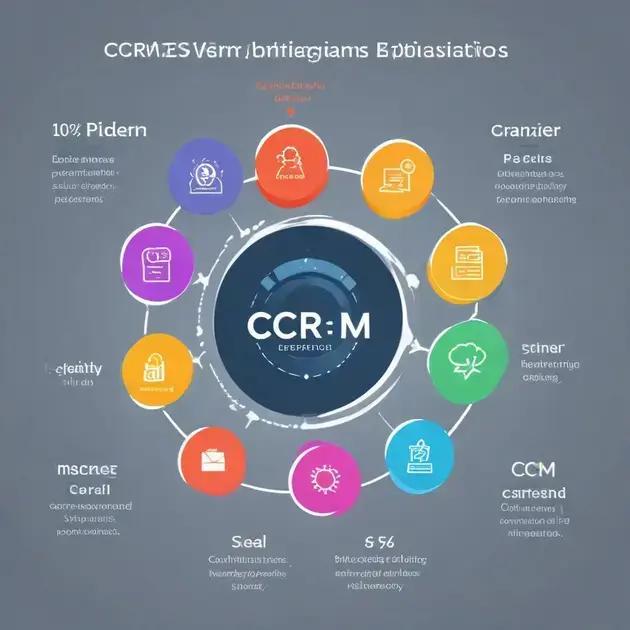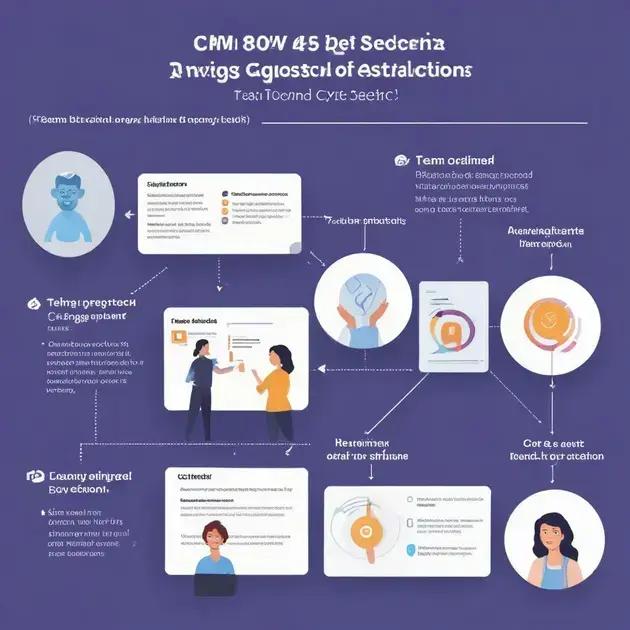A CRM system is a vital tool for enhancing customer relationships, streamlining sales processes, and improving operational efficiency in businesses. By effectively managing customer data and interactions, a CRM can lead to increased sales, better customer retention, and overall growth.
CRM system demo is more than just a presentation; it’s a glimpse into how these powerful tools can transform your business operations. By exploring a demo, you’ll understand how a CRM system can streamline processes, enhance customer relationships, and boost your team’s productivity. In this article, we will dive into what a CRM system is, discuss its benefits, provide guidance on choosing the right one, and share insights from successful businesses that have embraced these systems.
What is a CRM System?
A CRM system stands for Customer Relationship Management system. It is a technology for managing all your company’s relationships and interactions with customers and potential customers. The goal of a CRM system is simple yet powerful: to improve business relationships to grow your business.
CRM systems help organizations stay connected to customers, streamline processes, and improve profitability. They enable businesses to consolidate customer information into a single database, allowing for easy access and management of customer data.
Key Features of a CRM System
Some common features of CRM systems include:
- Contact Management: Store and manage customer contact information and details.
- Sales Management: Track sales activities and manage sales pipelines effectively.
- Task Automation: Automate repetitive tasks to save time and reduce human error.
- Analytics and Reporting: Generate reports and insights on customer behavior and sales performance.
Types of CRM Systems
There are various types of CRM systems tailored for different business needs:
- Operational CRM: Focuses on automating customer-facing processes like sales and marketing.
- Analytical CRM: Analyzes customer data for better decision-making and strategies.
- Collaborative CRM: Enhances communication and collaboration among different departments, especially sales and customer service.
Understanding what a CRM system is and how it functions is crucial for businesses looking to foster better customer relationships and improve overall operational efficiency.
Benefits of Using a CRM System

Using a CRM system offers numerous advantages for businesses, enhancing customer relationships and improving operational efficiency. Below are some key benefits:
Improved Customer Relationships
A CRM system helps businesses manage customer interactions effectively. By keeping track of customer information and communication history, companies can personalize their engagement, leading to stronger relationships and increased customer loyalty.
Enhanced Sales Performance
With a CRM system, sales teams can access vital data and insights about leads and customers. This information allows for more targeted sales efforts, which can result in higher conversion rates and ultimately, increased sales revenue.
Better Data Organization
CRM systems centralize all customer information in one place, making it easier for teams to access and analyze data. This organized data storage boosts productivity and eliminates time spent searching for information.
Increased Efficiency
By automating routine tasks, such as follow-up emails and data entry, CRM systems save time and reduce the likelihood of errors. This enables employees to focus on more productive activities, enhancing overall efficiency.
Insights Through Analytics
Many CRM systems come with built-in analytics tools that help businesses track performance metrics and customer behavior. By understanding these insights, companies can make informed decisions and refine their strategies.
How to Choose the Right CRM for Your Business
Choosing the right CRM system for your business is crucial for maximizing the benefits it can provide. Here are some steps to help you make an informed decision:
Identify Your Needs
Begin by assessing what your business truly needs from a CRM. Consider factors such as the size of your team, the type of data you need to manage, and specific features important to your operations, like sales tracking, customer service, or marketing automation.
Set a Budget
CRM systems come with various pricing models, including subscription-based and one-time payment options. Determine your budget and choose a system that offers the best value for your needs without compromising on essential features.
Look for Scalability
Your business may grow, and your chosen CRM should be able to scale with you. Select a system that can accommodate more users and data as your business expands, ensuring long-term usability.
User-Friendly Interface
A complex CRM may lead to employee frustration and lower adoption rates. Look for a system with an intuitive and user-friendly interface that simplifies the learning process for your team.
Check for Integrations
Ensure the CRM you select can integrate with other tools and software your business is currently using, such as email platforms, marketing tools, or accounting software. This interconnectedness helps streamline your business processes.
A Step-by-Step Guide to CRM System Demos

Testing a CRM system through a demo is an essential step in selecting the right software for your business needs. Here is a step-by-step guide to ensure you make the most out of your CRM demo experience:
Step 1: Prepare Your Team
Before the demo, it’s important to assemble a team that includes key stakeholders from sales, marketing, and customer service. Discuss what your specific requirements are and what functionalities are crucial for your business success.
Step 2: Define Your Goals
Clearly outline the goals you aim to achieve with a CRM system. These goals could include improving customer retention, increasing sales, or automating tasks. Having defined goals will help you evaluate the demo effectively.
Step 3: Request a Customized Demo
Ask the CRM provider for a demo tailored to your specific needs. This ensures that the demonstration focuses on the features that matter most to your business, rather than a generic overview.
Step 4: Ask Questions
During the demo, engage actively by asking questions about the functionalities, ease of use, and how the system can address your unique challenges. This interaction will provide clearer insights into the CRM’s capabilities.
Step 5: Evaluate and Collect Feedback
After the demo, gather feedback from your team. Discuss what worked well, what features you liked, and any concerns you may have. This collaborative evaluation is vital in making an informed decision.
Real-Life Success Stories with CRM Systems
Real-life success stories illustrate how businesses have transformed their operations by implementing CRM systems. Let’s explore a few inspiring examples:
1. A Retail Chain’s Customer Loyalty Boost
A popular retail chain faced challenges in retaining customers. By adopting a CRM system, they were able to analyze purchasing behaviors and customer feedback. This data allowed them to tailor their marketing campaigns and launch a loyalty program. As a result, customer retention increased by 30%, and sales grew significantly within just a few months.
2. A B2B Company Streamlines Sales Processes
A B2B company struggled with inefficient sales processes, leading to missed opportunities. After implementing a CRM, they streamlined their sales pipeline, allowing sales reps to track leads effectively. The automation of follow-up emails and task reminders resulted in a 50% increase in sales conversions. This CRM introduction significantly boosted productivity among their sales team.
3. Improved Customer Support in a Tech Firm
A technology firm was overwhelmed with customer support inquiries and struggled to provide timely responses. By integrating a CRM system into their operations, they could categorize and prioritize support requests. This change reduced response times by 40% and improved customer satisfaction ratings dramatically. The CRM also provided valuable insights into common issues, helping the team proactively address customer concerns.
4. A Non-Profit Aims for Greater Engagement
A non-profit organization aimed to increase engagement with its donors and volunteers. By utilizing a CRM, they successfully tracked contributions, organized events, and managed communication strategies. Their efforts led to a remarkable increase in volunteer participation and donations, demonstrating the impact of effective relationship management in the non-profit sector.
In Conclusion: Leveraging CRM Systems for Growth
Implementing a Customer Relationship Management (CRM) system can significantly enhance your business operations. By effectively managing customer relationships, improving sales processes, and providing valuable insights, a CRM can lead to greater efficiency and success.
As we’ve seen through real-life success stories, companies across various industries have experienced remarkable transformations by adopting CRM systems. From increasing customer loyalty in retail to streamlining sales efforts in B2B environments, the benefits are clear.
Take the time to assess your business needs, explore CRM options, and prepare your team for a smooth transition. Remember, the right CRM can not only improve your current processes but also set your business up for long-term success and growth.
Don’t hesitate to unlock the full potential of a CRM system for your business!
FAQ – Frequently Asked Questions about CRM Systems
What is a CRM system?
A CRM system is a Customer Relationship Management tool that helps businesses manage and analyze customer interactions and data throughout the customer lifecycle.
How can a CRM system improve my business?
A CRM system can enhance customer relationships, streamline sales processes, improve data organization, and increase overall business efficiency.
What features should I look for in a CRM system?
Look for features like contact management, sales tracking, automation of tasks, analytics, and integration with other tools you already use.
How can I ensure my team adopts the new CRM system?
To ensure adoption, involve your team in the selection process, provide adequate training, and highlight the benefits of the new system for their daily tasks.
Can a CRM system help with customer retention?
Yes, a CRM system helps analyze customer data, enabling personalized communication and targeted marketing efforts that can significantly improve customer retention.
Are CRM systems suitable for small businesses?
Absolutely! CRM systems can benefit businesses of all sizes by improving organization, efficiency, and customer relationships.




